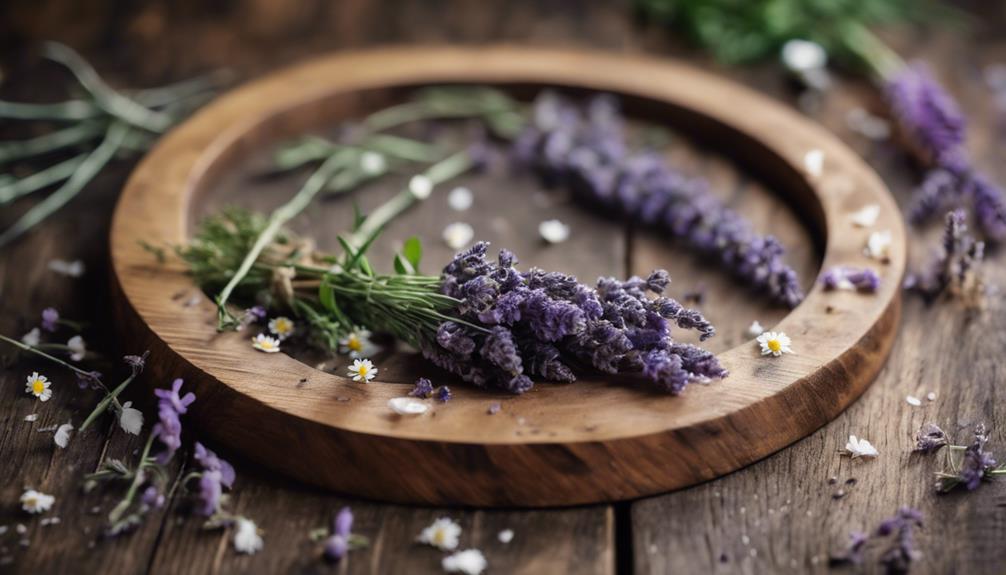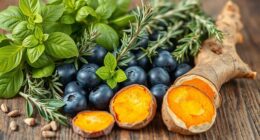To guarantee herbal safety and avoid harmful drug interactions, always consult healthcare professionals before adding herbs to your routine, especially if you’re on medication. Read labels carefully, noting ingredients, dosages, and warnings. Understand that herbs can interact with your medications, causing side effects or reducing effectiveness. Monitoring how your body responds helps catch issues early. Staying informed on new research and safety guidelines ensures you use herbs wisely—continue exploring to learn more about keeping your herbal use safe.
Key Takeaways
- Always consult healthcare professionals before combining herbs with prescription or OTC medications.
- Read herbal product labels carefully to identify active ingredients, dosage instructions, and potential interaction warnings.
- Be aware of common herb-drug interactions that may alter medication effectiveness or increase side effects.
- Monitor your body for adverse reactions or changes when starting new herbal remedies or combining them with medications.
- Use standardized herbal products and store them properly to ensure safety, potency, and predictable interactions.
Understanding Herbal Remedies and Their Uses

Herbal remedies have been used for centuries to treat various health conditions, offering natural alternatives or complements to conventional medicine. To understand their uses, you need to look into herbal preparation methods, which vary widely—from teas and tinctures to capsules and topical applications. Knowing how herbs are prepared helps determine their potency and safety. Equally important are traditional use assessments, which involve examining historical and cultural practices to understand how herbs have been used safely over time. These assessments guide you in recognizing which herbs have a proven track record of efficacy and safety. By combining knowledge of preparation methods with insights from traditional use, you can better appreciate the potential benefits and appropriate applications of herbal remedies. Additionally, understanding the contrast ratio of herbal preparations can influence their perceived effectiveness and safety in various treatments.
Recognizing Potential Side Effects of Common Herbs

While understanding how herbs are prepared and their traditional uses provides a solid foundation, it’s equally important to recognize that natural doesn’t always mean risk-free. Herb toxicity can occur if you consume herbs improperly or in excessive amounts, leading to unwanted side effects. Being aware of side effect awareness helps you identify symptoms like nausea, dizziness, or allergic reactions early. For example, some herbs may cause stomach upset or interact negatively with medications, risking more serious health issues. Recognizing these potential signs allows you to take prompt action and prevent complications. Additionally, consulting reliable sources ensures you are informed about herb safety guidelines and proper usage. Furthermore, understanding Herb toxicity can help you avoid dangerous interactions and adverse reactions. Remember, even common herbs like echinacea or ginseng can have adverse effects if misused. Staying informed about herb safety and side effects ensures you enjoy the benefits safely.
The Importance of Consulting Healthcare Professionals

Consulting healthcare professionals helps guarantee you’re using herbs safely and effectively. They can identify potential interactions with medications you’re already taking. Always check with a professional before adding new herbs to your routine to prevent harm.
Professional Guidance Ensures Safety
Because herbal remedies can interact with medications and affect health in unexpected ways, consulting healthcare professionals before use is essential. They can guide you on proper herbal preparation and ensure you’re sourcing herbs safely. Professional guidance helps prevent adverse reactions and optimizes benefits, giving you confidence in your choices. Additionally, understanding herbal safety principles can help you recognize which herbs are best suited for your needs. Being aware of potential drug interactions is crucial for maintaining overall safety when using herbal remedies. Staying informed about regulatory standards can also support safer herbal use practices.
Prevents Harmful Interactions
Herbal remedies can offer significant health benefits, but they also carry the risk of harmful interactions with prescription and over-the-counter medications. To prevent dangerous herbal interactions, it’s essential to consult healthcare professionals before starting any herbal supplement. They can review your current medications and identify potential safety precautions, reducing the risk of adverse effects. Healthcare providers understand how herbs can influence drug effectiveness or cause side effects, helping you avoid harmful combinations. Additionally, knowing the local business hours can be useful if you need to visit a pharmacy or healthcare provider in person. Being aware of herbal pharmacology can further enhance your understanding of how herbs interact with medications. It is also beneficial to familiarize yourself with cultural influences that may affect herbal use in different regions, ensuring you consider local practices and potential risks. Understanding drug-herb interactions can help you recognize warning signs and prevent adverse reactions early. Recognizing the potential side effects of herbal remedies is crucial for maintaining your safety. By seeking professional guidance, you ensure your use of herbal remedies remains safe and effective. Remember, even natural products can cause serious interactions if not properly managed. Prioritizing expert advice is the best way to protect your health and make informed decisions about herbal use.
Identifying Herbs That Interact With Prescription Medications

Certain herbs can substantially alter how prescription medications work in your body, making it essential to recognize which ones pose a risk. Some herbs exhibit herbal synergy with medications, amplifying effects and increasing side effects or toxicity. For example, ginseng or St. John’s Wort may enhance or diminish drug efficacy, leading to unexpected outcomes. Herb contraindications are also critical; herbs like garlic or ginkgo can thin blood, raising bleeding risks when combined with anticoagulants. To identify herbs that interact with your medications, consult reliable sources and speak with healthcare providers. Being aware of these interactions helps prevent adverse effects and ensures your treatments work safely. Recognizing potential herb-drug interactions empowers you to make informed choices about herbal supplements and prescription medicines, especially considering how supplements like low carb foods can influence overall health management. Additionally, understanding how herbal synergy can enhance or interfere with medication effectiveness is crucial for safe usage.
How to Read and Interpret Herbal Labels

Reading herbal labels carefully is essential to guarantee you’re choosing safe and effective supplements. Start by familiarizing yourself with herbal label symbols, which indicate important information such as organic certification, allergen warnings, or if the product is intended for specific uses. Next, focus on dosage instructions; these guide you on how much and how often to take the supplement. Always check that the recommended dosage aligns with your needs and consult your healthcare provider if unsure. Pay attention to expiration dates, ingredient lists, and any cautions noted on the label. Clear, accurate labels help you make informed decisions and avoid potential adverse effects or interactions. Additionally, understanding the best beaches and their characteristics can contribute to your overall wellness and relaxation routines. Properly reading herbal labels can also help you identify energy-efficient appliances, which can contribute to a healthier home environment. Being aware of the horsepower of electric dirt bikes can also inform your choices if you’re considering environmentally friendly transportation options. Furthermore, recognizing the importance of mental wellbeing assessments can guide you in choosing wellness products that support your mental health. By carefully reading labels, you ascertain safe supplement use and better manage your herbal health choices. Moreover, being aware of skin protection strategies can help prevent adverse reactions during outdoor activities like tanning or sun exposure.
The Role of Herbal Dosages and Standardization

Since herbal products can vary widely in strength and potency, understanding dosage and standardization is essential for safe and effective use. Using standardized extracts ensures consistent levels of active ingredients, making dosage accuracy more reliable. When products are standardized, you know exactly how much of the key compounds you’re consuming, reducing the risk of under- or overdosing. This consistency helps you better manage your herbal regimen and minimizes potential adverse effects. Always check labels for standardized extracts and follow recommended dosages. Proper standardization also supports predictable therapeutic effects and safer interactions with medications. Standardized herbal extracts are more likely to meet quality standards, further ensuring safety and efficacy. Additionally, quality control procedures play a crucial role in maintaining the integrity of herbal products. By prioritizing standardized products, you enhance both safety and efficacy, ensuring you get the benefits you seek without unnecessary risks.
Monitoring Your Body’s Response to Herbal Supplements

Even with standardized herbal supplements, it’s important to stay attentive to how your body responds. Pay close attention to any changes in energy, digestion, or allergic reactions. Keep track of your herbal dosage to ensure you’re not exceeding recommended amounts, as this can affect your body’s response. Herbal standardization helps maintain consistency, but individual reactions can vary. If you notice adverse effects or unusual symptoms, consult your healthcare provider promptly. Monitoring your body’s response allows you to adjust the herbal supplement intake safely and effectively. Remember, even natural products can cause side effects if not used properly. Staying vigilant helps prevent potential interactions or health issues, ensuring you benefit from herbal supplements without compromising your well-being.
Managing Polypharmacy and Multiple Herbal Use

Managing multiple herbal supplements alongside prescription medications requires careful coordination to avoid harmful interactions. When combining traditional remedies, it’s essential to understand how herbal extraction methods can influence potency and effects. Different extraction techniques, such as tinctures or teas, may concentrate active compounds differently, impacting how herbs interact with drugs. Always inform your healthcare provider about all herbal products you’re using, especially when managing polypharmacy. Keep track of the herbs’ origins and preparation methods, as these can affect safety. Be cautious with herbs that have overlapping effects or similar active ingredients. Regularly review your medication and herbal regimen to prevent unintended interactions. By staying informed and organized, you can safely navigate multiple herbal use without compromising your health.
Safe Practice Tips for Incorporating Herbs Into Your Routine

Incorporating herbs into your routine can enhance your well-being, but it’s important to do so safely. Start by selecting high-quality herbs from trusted sources to ensure herbal sourcing is dependable. Always store herbs properly in a cool, dark place to preserve their potency and prevent spoilage. When adding herbs to your routine, begin with small doses to monitor your body’s response. Consult with a healthcare professional, especially if you’re on medications. Use the table below to help keep track of your herbal routine:
| Herb Name | Dosage & Timing | Source & Storage Tips |
|---|---|---|
| Echinacea | 1 tsp daily | Store in airtight container, away from light |
| Peppermint | Tea twice daily | Buy from reputable supplier, keep dry |
| Ginseng | 500 mg in the morning | Confirm sourcing, avoid humidity |
| Turmeric | 1 tsp in meals | Purchase fresh or powdered, store cool |
| Lavender | 2 drops essential oil | Keep in dark glass bottle, away from heat |
Staying Informed About New Research and Herb Safety Guidelines

Staying updated on the latest research helps you understand how herbs may affect your health. You should regularly check new studies and guidelines to guarantee safe use. By doing so, you can make informed decisions and avoid potential risks.
Monitoring Latest Herb Studies
How can you guarantee you’re up-to-date with the latest herbal research and safety guidelines? Regularly reviewing reputable sources helps you stay informed. Keep an eye on recent studies that explore herbal efficacy, verifying if traditional uses are supported by scientific evidence. You can also subscribe to herbal journals and follow updates from health organizations. Imagine this as a chart:
| Herbal Study Focus | Key Findings | Safety Implications |
|---|---|---|
| Echinacea | Boosts immunity | Watch for allergic reactions |
| Ginseng | Enhances energy | Monitor blood sugar levels |
| St. John’s Wort | Mood support | Interacts with medications |
| Turmeric | Anti-inflammatory | Check for bleeding risks |
Staying current helps you identify safe, effective herbs and avoid outdated or unsafe practices.
Adhering to Safety Guidelines
To effectively adhere to safety guidelines, you need to stay informed about the latest research and updates from reputable sources. Regularly review new findings on herbal safety and drug interactions to understand potential risks. Proper herbal storage is crucial; keep herbs in airtight containers away from heat and moisture to preserve potency and prevent contamination. When it comes to herbal cultivation, ensure you’re following current best practices to avoid contamination or misidentification, which can lead to adverse effects. Staying current with safety guidelines helps you recognize any changes in herb safety profiles or contraindications. By keeping informed, you can make better decisions about sourcing, storing, and using herbs safely, minimizing risks and maximizing benefits for yourself and others.
Frequently Asked Questions
Can Herbal Remedies Cause Allergic Reactions in Some Individuals?
Yes, herbal remedies can cause allergic reactions in some individuals. If you have herbal sensitivities or are prone to allergies, you should be cautious. Always start with a small dose and monitor how your body responds. If you notice symptoms like itching, swelling, or difficulty breathing, discontinue use immediately and consult your healthcare provider. Being aware of potential allergic reactions helps you enjoy herbal remedies safely.
Are There Specific Herbs That Are Unsafe During Pregnancy or Breastfeeding?
You should avoid certain herbs during pregnancy and breastfeeding, as they can be unsafe. For herbal safety during pregnancy, steer clear of herbs like pennyroyal, blue cohosh, and certain types of sage, which may cause contractions or other complications. When considering herbs and breastfeeding safety, avoid herbs like mugwort and wormwood, as they might pass into breast milk and affect your baby. Always consult your healthcare provider before using any herbal remedies during these times.
How Do Herbal Interactions Vary Between Different Age Groups?
You should know that herbal interactions vary with age due to age-specific considerations and physiological changes. Older adults may need dosage adjustments because their metabolism slows, increasing the risk of adverse effects. Children and teens also require careful consideration, as their bodies process herbs differently. Always tailor herbal use to age, consult healthcare providers, and adjust dosages accordingly to guarantee safety and minimize interactions across different age groups.
What Are the Signs of Herbal Toxicity to Watch For?
Oh, the charming signs of herbal toxicity—think nausea, dizziness, and strange skin rashes, as if your body’s throwing a mini tantrum. Watch out for signs of toxicity like stomach upset, confusion, or allergic reactions. Dosage concerns are key; taking too much can turn your herbal remedy into a health hazard. Stay alert, follow recommended doses, and if symptoms appear, seek medical advice before your herbal adventure turns sour.
Can Herbal Supplements Affect Laboratory Test Results or Diagnostics?
Herbal supplements can definitely affect laboratory test results and diagnostic accuracy. They may cause lab test interference by altering enzyme levels, blood components, or other markers, leading to false positives or negatives. You should inform your healthcare provider about any herbal products you’re taking before tests. This helps make certain of accurate diagnostics and avoids misinterpretation that could impact your treatment plan. Always disclose herbal supplement use for safe, reliable healthcare assessments.
Conclusion
Remember, knowledge is power when it comes to herbal safety. Always consult healthcare professionals before adding new herbs to your routine, and stay informed about potential interactions. Keep a close eye on how your body responds, and don’t assume more is better. As the saying goes, “Forewarned is forearmed.” By staying cautious and educated, you can enjoy the benefits of herbs while safeguarding your health.










